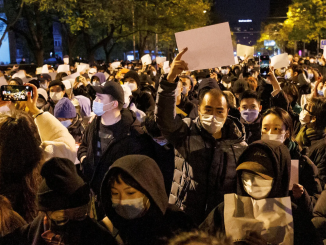
On October 16th, a train accident in the Ardennes forest, at the Saint-Pierre-sur-Vence level crossing, demonstrated how the National Railways Company (SNCF) cost cutting strategy endangers lives. A catastrophe was only avoided thanks to the actions of the train driver, who was the only SNCF employee on the train. Railway workers are fed up and they expressed it through a massive work stoppage, using their “right to withdraw”.
In just a few days, more trains have been cancelled than ever before, with most drivers and inspectors stopping work. Despite SNCF’s (the state owned railway) claims, traffic is not back to normal, and the anger has not subsided. Railway workers also feel great pride to have stood up to the company, particularly to have dared disregard pre-notifications procedures that governs work stoppages in public companies. These procedures are basically anti-strike laws to inhibit workers’ fighting spirit. This was a first on a national scale. To those who cry about the lack of “minimum service” during that weekend, railway workers reply that without new hires and investments the service will stay minimal every day. They want the best, not the minimum, for themselves and for the passengers!
Against the fat cats who govern and exploit us
Ministers and SNCF management describe the strike as a “surprise”, as if it had been organized secretly to ruin mid-term holidays, or as a “wildcat” strike. But the only “wildcats” are these fat cats, like Guillaume Pepy and Edouard Philippe, who threaten railway workers with lawsuits when the workers were simply fighting for safety, for themselves and the passengers. The same ministers oversee the underfunding of all essential public services, cut hospital funding, send cops against firemen, and obliterate environmental standards for the benefit of polluters like Lubrizol. They saturate the media with threats against the railway workers who stand up to them, but say nothing about the serious accident that provoked the strike.
A deadly profitability policy
Level crossings (where the train crosses a roadway) cause one accident every three days, with an average 36 deaths per year. The most dangerous ones could be quickly replaced for a few billion euros, but the budget allocated for this is only a few dozens of millions.
Adding to this negligence from the State, there is the capitalistic management of SNCF, focused on profitability of the company and its private subsidiaries. By having only one railway worker (the driver) on board regional trains, SNCF management know they are taking a risk. A “calculated” risk as they say, that is, money-making. In the last few months, as this “single agent” practice has been introduced in one location after another, it triggered some strikes that have so far been scattered. Management has ignored these warnings.
Last Wednesday in Saint-Pierre-sur-Vence, after the accident, the driver, had to walk 1.5 kilometers on the track to prevent another collision. Passengers remained in the train with no help and no information for a while. If conductors had been on board they would have dealt with the incident: their main job is to be with the passengers and ensure their safety, not to fine them – even if management is pressuring them to do so.
Warning shots against the bosses’ attacks
The railway workers who let their anger explode can be proud to have shaken SNCF management. They can also be proud to have caused a major setback to the government that always supports the bosses to go further in their attacks against workers. And this happened at a time when bosses and government prepare their reform against the pensions of all workers, not just those covered by “special” schemes.
The current outcry of the railway workers is a new warning shot against the attacks from government and bosses, after the spectacular strike in the Paris public transport on September 13th.



